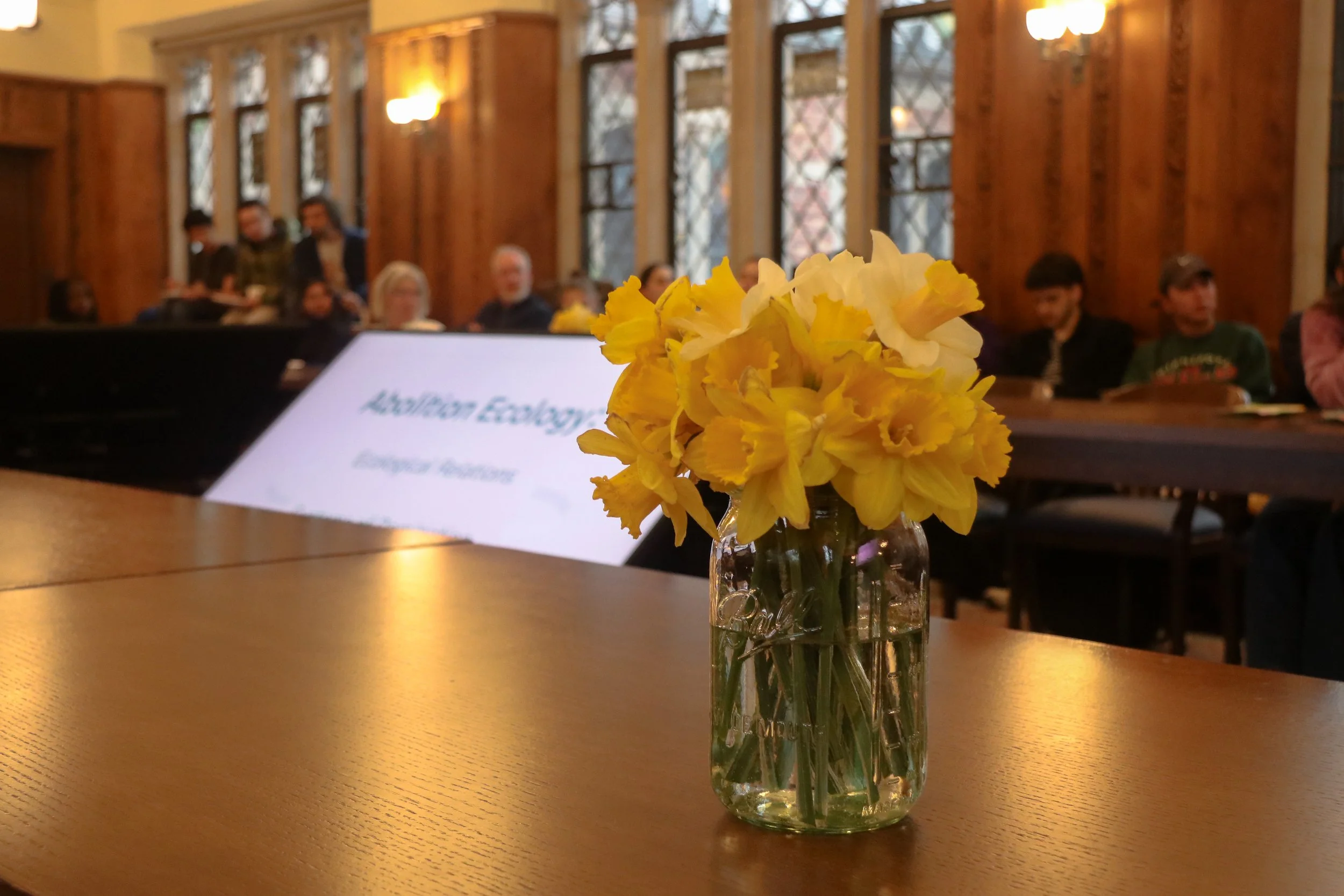





On April 10, 2024, from 6:00 – 8:00 P.M., the Yale Sustainable Food Program hosted its eleventh annual Melon Forum at the Humanities Quadrangle, where 5 Yale seniors presented their senior theses relating to food and agriculture: Amelia Davidson, Jack Denning, Kanyinsola Anifowoshe, Tadea Martin-Gonzalez, and Lisbette Acosta, majoring in subjects from American Studies to Psychology. Cierra Ouelette and Bea Soto contributed their prospectuses to our 2024 Melon Forum brochure, which was collated by Hilary Griggs '24 who planned and led the event. The students’ projects ranged across disciplines, methodologies, and theories, utilizing novel approaches to tackling wicked problems in food systems. To view the Melon Forum brochure, please visit this link.
Kanyinsola Anifowoshe '24 began the event with her presentation, assessing the collaborative public art project, Solitary Gardens, through an abolition ecology framework. Applying recent scholarship on the intersections of race, social relations, space, gender, and power in her examples of letters from incarcerated individuals, Anifowoshe shared why ties to ecology can “uproot systems of death and domination.”
Following Anifowoshe, Lisbette Acosta '24 shared her senior thesis situated in her home country. Using statistical analysis, "Household food and water insecurity and the association with life satisfaction in the Dominican Republic," examined foodways and resource allocation changes after the pandemic, ultimately signaling a gap in resource allocation for older individuals, less educated individuals, and women.
We returned from a quick break, where we refilled our plates with the wonders of a Caseus cheese platter, to a presentation centering around the history of indigo. Amelia Davidson '24 took us on a journey of British and American imperialism, sharing the deep history of indigo from India, Japan, West Africa, and North America before colonial contact. Davidson weaves us through the imperial power structures of indigo up until the late nineteenth century, from its path to a “simple mercantile good,” to a color used to “appropriate and other non-Western cultural tastes.”
While Davidson examined indigo production on a cross-continental scale, Tadea Martin-Gonzalez '24 looked at a multinational corporation, the United Fruit Company (UFC), at a singular site: Golfito, Costa Rica. In her presentation, Martin-Gonzalez used visual/site analysis along with familial oral history to unpack colonial nostalgia prevalent in a town built by UFC rooted in “principal Indigenous erasure and Black exclusion.” The preservation politics of place and space that are prevalent in the idea of banana culture in the 1930s in many ways lay a foundation for settler violence which is seen in the Megayacht culture emerging on the coastal waters of Golfito today.







Finally, Jack Denning '24 presented a portion of thesis research that in the end was omitted from his final paper: The Southern Tenant Farmers’ Union (STFU). Established in 1934 by a group of Black sharecroppers, STFU grew to nearly 400,000 members by 1938. Using historical analysis, Denning focuses on the speeches and life of one of STFU’s most outspoken non-Black union members, Claude Williams, articulating that Williams’ frameworks of racial capitalism allowed for a better understanding of poor working conditions prevalent in southern farmworkers.
Around fifty students gathered to watch these seniors present their culminating Yale academic works. We hope you’ll join us next year at our 12th annual Melon Forum, featuring projects from the Class of 2025.
To view photos from the event, please follow this link for the first half of the event, and follow this link for photos from the second half of the event. Photos by Fafa Van Ha ’22 and Avery Wayne ’26.

